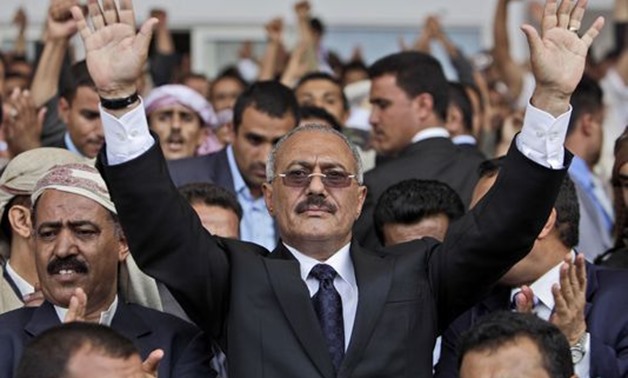
Former President of Yemen Ali Abdullah Saleh – press photo
CAIRO – 5 December 2017: The General People's Congress Party announced on Monday the murder of its chairman and former Yemeni president, Ali Abdullah Saleh, following reports of cancelling his alliance with Houthi rebels and joining the Saudi-led military coalition.
Egypt Today looks at the chronology of Yemen’s internal conflict that turned into chaos.
January 2011: Yemeni people took to the streets, protesting against the ruling regime, inspired by Tunisian demonstrations. President Saleh pledges not to extend his presidency in 2013.
June 2011: President Saleh was badly injured in a rocket attack and flown to Saudi Arabia amid mounting protests across Yemen.
September 2011: President Saleh returned home after receiving treatment.
November 2011: President Saleh agrees to hand over power to his deputy, Abdrabbuh Mansour Hadi. A unity government including a Prime Minister from an opposition party was formed.
February 2012: Hadi inaugurated as president of Yemen after uncontested elections.
November 2012: A Saudi diplomat was shot dead in Sanaa. Security officials say the assailants, who opened fire on the diplomat's convoy, were dressed in police uniforms.
January 2014: The National Dialogue Conference – a transitional dialogue process held in Sana'a as part of the Yemeni crisis reconciliation efforts – reached a document on which the new constitution will be based.
February 2014: The Yemeni President gave approval for Yemen to become a federation of six regions as part of its political transition.
July 2014: Tribesmen blow up the country's largest oil pipeline, disrupting supplies from the interior to a Red Sea export terminal.
August 2014: President Hadi sacks his cabinet following two weeks of anti-government protests, in which Houthi rebels were heavily involved.
September 2014: Houthi rebels take control of Sana'a.
January 2015: Houthis reject draft constitution proposed by government.
February 2015: Houthis appoint presidential council to replace President Hadi, who flees to Aden southern stronghold.
2015 March - President Hadi sent the United Nations Security Council a letter asking for a Chapter VII resolution inviting all willing countries to provide support to deter the Houthi advance in the south. He also informed the Council about his request to the GCC and other Arab countries to intervene militarily against the Houthis.
Houthi rebels start to advance towards Southern Yemen. President Hadi flees Aden.
Saudi-led coalition of Gulf Arab states launches air strikes against Houthi targets and imposes naval blockade.
May 2015: The Security Council issued a press statement welcoming the Secretary-General’s announcement of consultations among all Yemeni stakeholders in Geneva on 28 May, calling on all Yemeni parties to attend these talks and engage without preconditions.
June 2015: Geneva talks were postponed. The Security Council urged Yemeni stakeholders to engage in talks without preconditions and in good faith, and endorsed the Secretary-General’s call for humanitarian pauses. Leader of Al-Qaeda in Arabian Peninsula, Nasser Al-Wuhayshi, killed in US drone strike in Yemen.
September 2015: President Hadi returns to Aden after Saudi-backed government forces recapture of the port city from Houthi forces and launches advance on Aden.
February 2016: The Security Council issued a press statement expressing serious concern over Yemen’s humanitarian crisis, urging all parties to the conflict in Yemen to take urgent steps towards a ceasefire.
The Council adopted resolution 2266, renewing Yemen sanctions measures until February 2017.
April 2016: Start of UN-sponsored talks between the government on one side, with Houthis and former President Saleh's General People's Congress on the other. The UN Security Council adopted a Yemeni presidential statement to support peace talks that had started in Kuwait earlier that month. The presidential statement called for Yemeni parties to develop a roadmap for the implementation of interim security arrangements, withdrawals, handover of heavy weapons and the restoration of state institutions and resumption of political dialogue.
June 2016: The UN Special Envoy to Yemen, Ismael Ould Cheikh Ahmed, reported to the Council that he had presented the parties in Kuwait with a roadmap that provides for the implementation of resolution 2216 and the establishment of a national unity government.
October 2016: After three months of UN-brokered talks in Kuwait, the negotiations did not yield any significant results. Houthi forces attacked a UAE vessel operating near Bab Al-Mandeb strait.
The US conducted missile strikes on radar facilities affiliated to Houthis following a Houthi cruise missile launches at US Navy warships around Bab Al-Mandeb.
Airstrike by Saudi-led coalition hits a crowded funeral in Sanaa, killing 140 mourners and injuring 500.
January 2017: A US raid kills several suspected Al-Qaeda militants and civilians in America's first military action in Yemen under President Donald Trump.
The UN Security Council issued a statement expressing serious concern at the devastating humanitarian impact of the conflict and calling on all parties to allow unhindered access for humanitarian supplies and to facilitate access for essential imports of food, fuel, and medical supplies. It also called on all parties in the conflict to renew their commitment to a cessation of hostilities.
February 2017: The Security Council adopted resolution 2342, extending the Yemen sanctions measures for an additional year.
March 2017: The United Nations Office for the Coordination of Humanitarian Affairs' (OCHA) head, Stephen O’Brien, who had travelled to Yemen, announced that Yemen became the world’s largest humanitarian crisis, with 18 million people in need of assistance, and was at risk of famine.
May 2017: Houthis continue firing missiles into Saudi Arabia, claiming to have fired one at the capital, Riyadh.
June 2017: Outbreak of cholera kills 2,100 and affects almost 900,000 others, medical agencies say.
December 2017: Former president Saleh reportedly switched war sides and his forces clashed with Houthis in the capital Sanaa. A Houthi-affiliated TV station announced the murder of Saleh after fierce fighting in the capital.

Comments
Leave a Comment